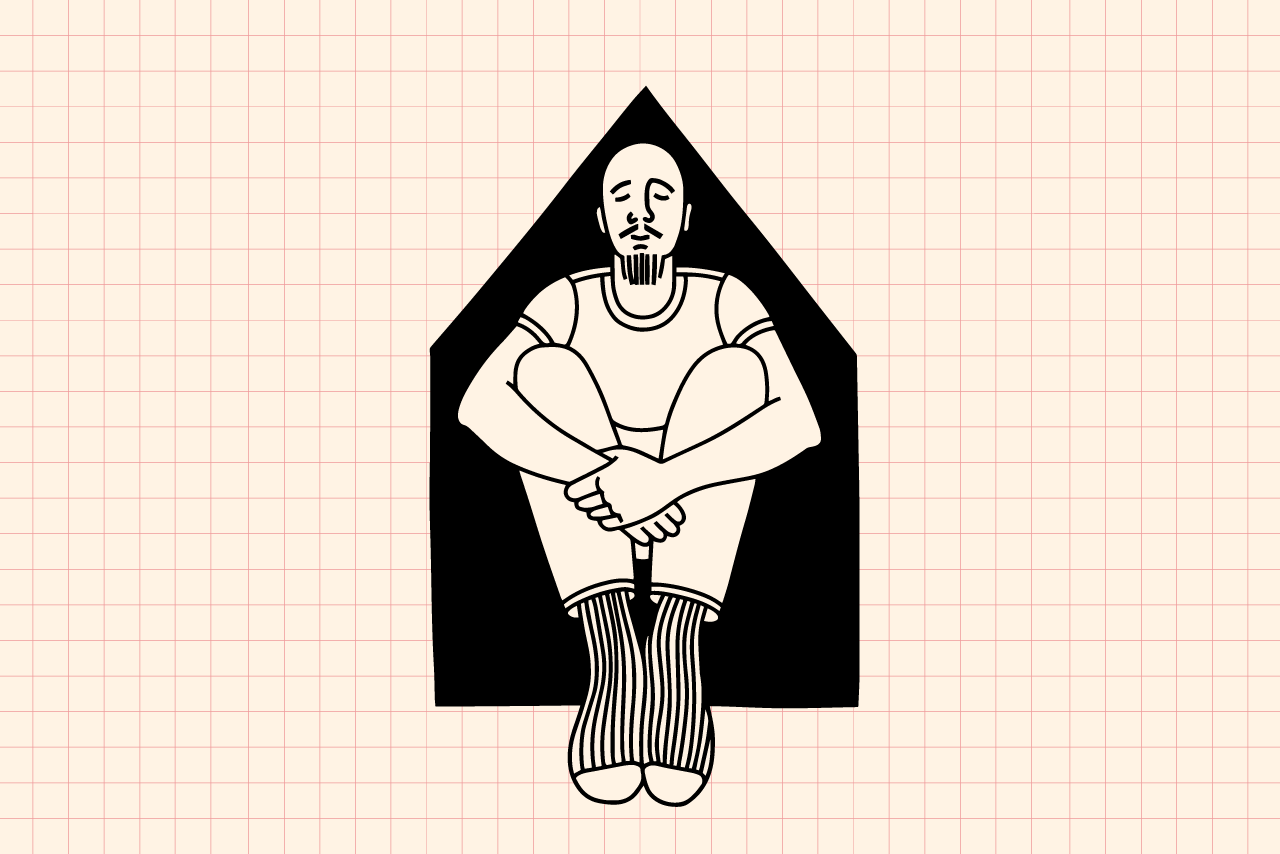
“You yourself, as much as anybody in the entire universe, deserve your love and affection.” ~Buddha
This unprecedented time has given us an opportunity to pause, reflect, and focus on the things that are truly important in our lives. As an unexpected benefit, the need for social distancing has provided many of us with much needed personal boundaries.
I grew up at time when children were seen and not heard, but we were never encouraged to have personal boundaries. We had no privacy, and there was a lack of understanding for the need for alone time. It reminds me of a scene in a Woody Allen movie where the husband is in the bathroom and the wife is yelling at him through the door. When the phone would ring, my mother would answer and would often listen in on the other phone until I would tell her to hang up.
As I have gotten older, I have become more aware of the need to have autonomous relationships with healthy boundaries. Something happened when I reached my fifties, I no longer had the energy or desire to give to situations that were not healthy.
Last year I experienced some health challenges, which I realized were from allowing myself to be involved in situations with unhealthy boundaries. The stress I experienced weakened my immune system and made me more susceptible to illness. I am no longer willing to compromise my health on situations that are unhealthy.
At some point in our lives we all need to “face our souls,” as Carl Jung once wrote, and do inner work on ourselves in order to heal and transform.
I have become aware that the only way to have healthy, nurturing relationships is for both people involved to look within themselves and recognize unhealthy patterns so they can do the necessary work to transform.
This time has really helped me re-evaluate my personal boundaries and have a new appreciation for the need for them and the freedom within them. Boundaries empower us by letting others know what works for us and what doesn’t, protecting our personal space and energy.
“Personal boundaries are physical, emotional, spiritual, or relational limits that define us as separate from others. Setting boundaries means that instead of taking on other people’s beliefs, standards, and feelings, we become in tune with our own. We learn to develop a more solid sense of self that helps us take control of what is important to us and make decisions that serve our value system.” ~Matot-Massei
Interestingly, if you’ve had boundary issues with members of your family, you most likely have similar issues in your personal relationships.
For example, in needy, co-dependent relationships there are no healthy boundaries. The individual’s boundaries are removed, leaving them to sacrifice their own identity to get the external love and affection they crave by meeting the needs and expectations of another. When you sacrifice your identity to meet the expectations of another, you lose your sense of self along with your self-esteem.
Some people tend to blame others for their emotions and their resulting behaviors, becoming the victim. They are waiting for—actually expecting—someone to come and save them and give them the love and attention they desire. In so doing, they’ve given away all their power.
Setting healthy boundaries empowers you, and hopefully will teach others in your life to do the same and learn how to take responsibility for themselves. Just remember, it’s not your job to do it for them. Learning self-love is really the key to this process.
If you are in a relationship like this, you need to ask yourself if you are helping or are you enabling?
Enabling can often be disguised as helping, but repeatedly rescuing someone from the consequences of their own behaviors perpetuates unhealthy behavior patterns.
When you set healthy boundaries, you don’t just empower yourself, you may also empower others in your life to take responsibility for themselves and start resolving their own problems and issues.
When you stop rescuing, you help them access their own inner strengths, helping them move toward realizing their own potential. Otherwise they will continuously look for answers and solutions outside of themselves, always feeling needy, incapable, and powerless.
How to Create Healthy Boundaries
Know thyself.
When you start becoming aware of your thoughts, needs, habits, likes, dislikes, values, and emotional reactions, it helps you understand who you are. Knowing who you are, who you want to be, and where your boundaries are helps you establish positive relationships with like-minded people.
When you become aware of what is emotionally draining and stressful, you can learn to manage yourself in those situations. Learn to let go of what no longer feels right for you.
Here are some situations that may be emotionally draining or stressful:
- Being around someone who has negative energy, is manipulative, threatening, blaming, bullying, or angry
- Going through a significant life change such as the death of a loved one, moving to a new home, loss of a job, or divorce
- Unrealistic expectations to meet the needs of someone in your life
- Feeling responsible for others’ emotions
- Believing your happiness is dependent on the actions of others
- Having difficulty asking for what you need because you are afraid of losing love (perhaps because you experienced disapproval when you didn’t behave a particular way when you were a kid)
- Feeling responsible for someone else’s happiness
Become aware of your patterns.
Unfortunately, most of us become wedded to our patterns. Generally, it most likely has been the narrative running through our lives for quite some time. How you behave in certain situations becomes a habit. In order to break a habit, you need to become aware of your patterns and your knee-jerk reactions, to not give them any oxygen.
Due to the situation with Covid my mother has moved in with me. My mom has always been a picky eater, and she tends to gravitate to meat or creamy dairy dishes that reflect the way she grew up. But if you’ve seen the recipes and pictures that I post, you know that what I prepare is the opposite. As a result, since arriving here, my mom has had to completely change her diet.
We joke about this change, and the fact that she has lost several unwanted pounds eating this way, but every so often she makes a negative comment and whines about having to eat so many vegetables. That’s when my patterned behavior of needing to please her kicks in, and I revert to my knee-jerk reaction of becoming defensive, creating a chill in the air.
I recognized my part in this situation and discussed with her that although we would continue to eat healthfully, I understood that it was a major change for her. We decided that once a week we would either prepare or order in a meal of her choosing and she would stop commenting negatively on our meals. This compromise has given her something to look forward to and has helped with that issue.
I realized that this was just another opportunity to see myself through a different lens and learn how to respond without taking it personally.
If you have issues that keep coming up, it’s important to identify the root cause and your role in them, (we always have a role in them) and become aware of the pattern. At this point it becomes important to learn to “catch yourself when you fall.” And then forgive yourself.
It reminds me of My Autobiography in Five Short Paragraphs, by Portia Nelson. When we react to events in our lives simply out of habit, we are unable to see clearly until we can become aware, take responsibility, and choose to make healthy changes to break free from our unhealthy patterns.
Jack Canfield says that “Event + Response = Outcome.” You may not have control or be in charge of the event, but you control and are in charge of your response. Learn to think things through and respond thoughtfully instead of reacting in a knee-jerk manner.
Let go of self-judgment.
In order to make changes you need to be your own cheerleader and embrace yourself for who you are and how far you have come. Don’t hide from your true self. When you screw up, acknowledge it, forgive yourself, let it go, and move on knowing next time you will do a better job. The faster you can do this, the easier it will get. Don’t condemn yourself when you screw up. Tomorrow is another day.
Pause.
Before you react to something, stop and check in with yourself. Is this a healthy response? Am I perpetuating the problem? Am I enabling the behavior? Is my response based on my own need or fear? Is this an old pattern that is no longer healthy?
Take a few deep breaths before you respond. A conscious response is better than an in-the-moment reaction.
When you remain calm, you will realize that changing your behavior will help you and the others in your life. A calm decision to change your behavior actually puts you in control and gives you back your power. This requires letting go of the fear that not following the old pattern will somehow lead to a loss of love. At the end of the day, that’s what this is all about.
Which brings me to my next point…
Work on letting go of your attachment to outcomes.
I go through times where it is easier to let go and just go with the flow. I do it with awareness and as a conscious choice. I feel like my certainty and trust in myself comes in waves. When I am able to completely let go, I feel a sense of calm and I am able to be in the moment.
When I was much younger, I was in a very difficult relationship with unhealthy boundaries. Jeff (not his real name) was divorced, with no children, so it seemed like it should work. However, even though they were divorced, Jeff and his ex-wife remained friends and talked frequently on the phone. She would drop in to visit, and he continued to do errands for her and help her out when she asked.
I really felt a strong violation of my personal boundaries, and my instincts were telling me it was not the right situation for me. But I could see potential in him and wanted to make it work. I remained in that situation until I learned to trust my own inner knowing.
When I was finally able to let go of my attachment to hoping this relationship could be something it was never going to be, I was able to free myself from this unhealthy situation.
It isn’t easy to let go of someone you care about, but self-care is about prioritizing your own well-being. This relationship became a powerful turning point for me because of the pivotal lessons I learned.
Learn to say no.
No is a complete sentence. There is no need to feel guilty about expressing yourself. If you say no, it requires no further explanation. You may choose to say, “No, that’s not going to work for me,” or “No, that’s not going to be possible.” Nothing else is required.
It’s important to express how you feel and ask for what you need. This is about finding your voice and making sure you are valued, by setting up healthy boundaries that empower both you and the others in your life.
Your peace of mind and sense of self are more important than anything else. Giving in to meeting the needs and expectations of others can cause stress, weakening your immunity and making you more vulnerable to getting ill. It’s so important to learn to say “no” when it’s needed and walk away from situations that are unhealthy. Anything else is simply not worth your time or energy.
About Ara Wiseman
Ara Wiseman is a leading nutritional expert, author, teacher and lecturer. Her private practice is focused on mind body wellness, weight loss, and weight-related health issues, including type 2 diabetes, high cholesterol, high blood pressure, and heart disease. Ara currently works at a medical clinic helping chronic care patients with their health. Ara has written and published three books; Feed Your Body Feed Your Soul, A Smoother You & The Healing Option. Visit her at arawiseman.com. Instagram /Facebook













 Though I run this site, it is not mine. It's ours. It's not about me. It's about us. Your stories and your wisdom are just as meaningful as mine.
Though I run this site, it is not mine. It's ours. It's not about me. It's about us. Your stories and your wisdom are just as meaningful as mine.
I absolutely loved reading this…thanks you Ara. At one moment, I felt like I have written it… thats how much it resonated with me. This was a good reminder to practice all that I might already know and have learned over a period to time. Its so easy to get lost in the old pattern but equally liberating and joyous once you know how to break the old bad habits. Thanks again.
Hi Ruchi,
I am so happy that the article resonated with you! Our life experiences can teach us a lot and it helps all of us, including myself to know that we deal with similar issues and can learn together on how to overcome them. Thank you! Ara
Thank you for this post, dear Are.
It was my morning’s uplift if that word exists 😉 I am in a rather difficult relationship issue, too, right now, and confusion and self-doubts are all over me. Your post helped a lot to turn my attention back to what’s most important: me, and my own role in all of this. Acknowledging, accepting and forgiving, and then – moving on. Thank you so much!
Love, Kat
Hi Kat,
Thank you so much for your feedback. I am glad you were able to reframe and turn your attention inwards. Relationships can be challenging but also act as a catalyst for our growth. Easier said than done when you are experiencing it. Thank you again, Ara
“even though they were divorced, Jeff and his ex-wife remained friends and talked frequently on the phone. She would drop in to visit, and he continued to do errands for her and help her out when she asked.
I really felt a strong violation of my personal boundaries, and my instincts were telling me it was not the right situation for me”
hmmmm.
i have always found it better to get to know exes- i have made a lot of friends that way- and it seems to me to indicate an insecurity on your part. how is their being friends violating your boundaries? I would personally find it a relief that my boyfriend relates so well to women that he can remain friends with his ex. that to me shows maturity, decency. being threatened by that says more about you than the situation. cheating is one thing- and maybe you got a vibe from him that he was a cheater? otherwise i think its something to ponder. i remember reading somewhere a therapist wrote, and i paraphrase, “its important to know how your partners treat their exes, because you will probably be one someday too”. i never got that whole jealousy/rivarly thing with women. still don’t.
Hi Carmen, Sorry, I just saw this. I agree with what you are saying but in that situation there was an unhealthy codependency and dishonesty. It was a really good learning experience for me. Thank you so much for sharing your thoughts.
Thank you for sharing this blog! It has some great reminders for me as I embark on a new relationship.